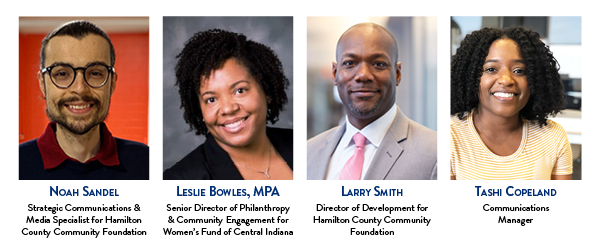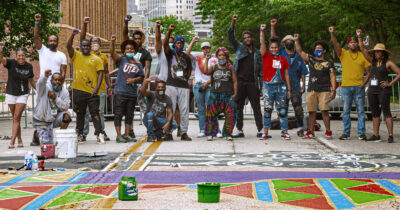Black Philanthropy Month, observed every August, is a global initiative that shows the ingenuity and transformative impact of the generosity of Black philanthropists. An important portion of this month is highlighting the experiences and uplifting the Black voices in the philanthropic sector. Read from some of our own staff on their perspectives being in this space.

What attracted you to a career in philanthropy and your current role with us?
Noah Sandel: The ability to progress visibility of what I’m made from within communities (and a state) that can push against it. I wanted to fill my need to do good work while maintaining my values.
Leslie Bowles: I was drawn to a career in philanthropy because I believe deeply in the impact we can collectively make to change our community. I want to use my time to partner with philanthropists, community organizations and our neighbors to help support the most under-appreciated people in our community. I believe everything we need to do to uplift our community must be done together. I came to Women’s Fund because I am passionate about the mission to uplift women and girls in our community, particularly women and girls of color whose voices and lived experiences have been ignored.
Larry Smith: I began my professional career in corporate America. I was blessed to have done very well, but I decided to leave that private sector after accepting the call to the ministry. I decided to go to the not-for-profit sector because I believed that it aligned better with my values. I applied for my current role at Hamilton County Community Foundation because I believe strongly in our organizational mission. Since I joined, I have discovered that we attempt to live out our values. That’s very important to me.
Tashi Copeland: I’ve always been in philanthropy in some capacity—whether it was for a large corporation or some small organization in my hometown. What I found exciting about CICF was coupling its mission for equity with my writing, all while allowing me to be unapologetically my Black, four-syllable name, faux-loc wearing, outspoken self.
From your perspective, what is the state of equity in philanthropy?
Noah: It is a unique microcosm available to those involved financially in philanthropic work. Like the mundanely used “executive hire,” you donate to what you know and are comfortable associating with. It can be better. It needs work. That’s why we do what we do.
Black people have seen organizations being hit by the diversity bug throughout history, but I hope the momentum of this moment continues.
Leslie: The murders of George Floyd and Breonna Taylor as well as the racial awakening many Americans have experienced over the past 18 months have created necessary conversations about equity in philanthropic organizations. We have seen a focus on developing equitable hiring practices and some movement in leadership opportunities for Black people in philanthropy. There have also been intentional conversations about the importance of investing in organizations led by people of color, but there is more work to do. Black people have seen organizations being hit by the diversity bug throughout history, but I hope the momentum of this moment continues. We must continue to elevate people of color to decision-making roles and uplift their voices in funding and investment conversations. The path to true freedom for all people is to ensure equitable representation and power.
Larry: Overall, the state of equity in philanthropy is poor, assuming that you’re referring to “institutional philanthropy.” This is not only from the standpoint of socioeconomic, racial inequity that creates and perpetuates the racial wealth gap; it is also from the standpoint of who leads philanthropic organizations and the disparity in the disbursement of grants. When I joined the not-for-profit sector 18 years ago, I was genuinely stunned to learn that only 2-4% of all grants go to organizations of, by, and for African Americans. Let’s just say that I’m no longer stunned. However, again, I believe that CICF is leading in this area – even as it recognizes that there is more internal work to do.
What is a unique gift that you attribute to your Black identity that you bring to philanthropy?
Noah: My vision of my Black community and self in a representative mini-society that’s often hidden. I can amplify it by seeing the need, person, group, or place that others ignore. Those parts of me that were ignored due to my multi-racial identity.
Larry: Philanthropy is one of the core tenets of our Diaspora. It crosses geographic, religious and cultural lines. It is ancient. Also, as has been verified empirically, African Americans give the highest percentage of our disposable income for charitable purposes than any other racial group in this nation. Without being ironic or oxymoronic, that is something that is both very humbling and a great source of pride. We should celebrate that fact more.
What has your biggest challenge been as a Black individual within the philanthropic sector?
Noah: Being recognized as a member of multiple communities while clearly advocating for the betterment/equity of one. How can I be both separate and equal to my racial histories simultaneously? Is that unfair or inequitable in itself?
Larry: The lack of racial equity in senior roles throughout the sector is a major, major problem. I don’t want to make that a personal issue–this is about our people. There is also the intersectionality of race and gender—which shouldn’t be at all surprising. We need to be in senior roles to shape culture, direct dollars and dismantle systemic racism more quickly, easily and permanently.
I think I came into this work thinking that people of color would automatically trust me just because I look like them. But that’s not the case. Black people are not a monolith.
Tashi: Being completely transparent, my biggest challenge has been just expecting other Black people to trust me with their stories. I have the responsibility and the privilege to tell the amazing stories of people doing incredible work in our community. So many times, people of color are exploited for their stories simply because an organization wants to show that they’re involved in conversations surrounding opportunity, equity and inclusion. I think I came into this work thinking that people of color would automatically trust me just because I look like them. But that’s not the case. Black people are not a monolith. Therefore, there should not be an expectation that just because I’m Black, I’ll get it. We all have unique backgrounds and experiences, and I don’t have the right to assume that someone will be comfortable with me sharing their story. For this work to truly be authentic and make real change in philanthropy, it has to be relational, and all assumptions have to go out the window.
What are the short- and long-term outcomes you are hoping to see with having more Black voices at the philanthropic table?
Noah: CHANGE. Not only in the way we give and options for giving but in how philanthropy can be seen as a community rather than an ivory pedestal stood upon by those who believe they are contributing to all—even if they omit communities they don’t even realize.
Larry: The inverse of my previous answer.
Tashi: I am hoping to change the narrative of “giving while Black.” I’m tired of the narrative that Black folks are “emerging donors.” We’ve been here. No, our names may not be on the side of a building, but we’ve always made an impact in our communities with time, talent and treasure. It just may not look like what some people deem as “traditional philanthropy.”
What’s one piece of advice you’d like to give other Black people wanting to enter the philanthropic sector?
Noah: Be fearful while being completely yourself. It won’t come easy – it never has, but to do it in your way with your eyes, voice, gait, and gamble – that is integral to the equitable future of philanthropy. Not bending for a broken system should scare you and that’s okay, ride it.
I am often reminded of advice Michelle Obama gave women at a speaking engagement, “if you are in a room and do not use your voice, you are taking up space.” Never take up space. Our communities are counting on you.
Leslie: One piece of advice I would give other Black people wanting to enter the philanthropic sector is to work at organizations aligned to your beliefs because even when the work is difficult, your commitment will keep you inspired. I would also tell Black people to be unrelenting in their values and use their voice to hold leaders and organizations accountable when they make decisions that are not aligned to your organization’s mission. Finally, you should also speak up and use your voice for good. I am often reminded of advice Michelle Obama gave women at a speaking engagement, “if you are in a room and do not use your voice, you are taking up space.” Never take up space. Our communities are counting on you.
Larry: Build wealth and create your own philanthropic institutions – or support Black-led ones that already exist. We’re never going to approach senior leadership in institutional philanthropy that reflects our percentage of the population, much less assume leadership that is disproportionate to our population. While I don’t necessarily regret leaving the private sector to join the not-for-profit sector, I’m much more sanguine (or, perhaps, cynical) about our sector than I was before I joined it. There must be a fundamental structural change in so many areas of our economy and society to even begin to approach parity. It’s hard to imagine that will take place in institutional philanthropy, at least in my lifetime.
Tashi: Know that you don’t always have to be the loudest person in the room to make real change in this industry. Be thoughtful. Be strategic. And when you’re ready, make your voice heard in whatever way works best for you.
What inspires you and keeps you motivated to do this work?
Noah: The knowledge of understanding my place. Am I here to give a space for the underrepresented and Black? Subjectively, I think it is my duty. But the work must be done and affect those with the true actions to make lasting change. And that comes from officials–locally to nationally. So vote. Vote by self-education and do not vote from spite or in ways that retroact a movement. We can’t get out of the muck if we keep allowing it to lead.
It is my responsibility, both to them and my descendants, to keep striving for equity. I can’t let them down.
Larry: I think about my ancestors—the ones who we all know, the people in my family—and the untold millions who I’ll never know. They paved the way for people like me. It is my responsibility, both to them and my descendants, to keep striving for equity. I can’t let them down.
Tashi: Although I’m creative, I’m also a numbers person—a good click-rate excites me. But it’s the one-off random emails that people send me—sometimes from across the country—saying some written work I shared changed their perspective or resonated with them that keep me going in this equity journey.






Leave A Comment